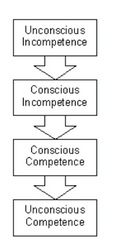I always like these small differences, but I think they are very useful when considering learning and how it might be created and the stage of the change journey the learner is on.
For example if you are creating a piece of learning you may need to consider if the person has already realised they are competent or not competent at doing something. You may want to help them through this realisaion from not being to becoming competent by having a quizz initially for the learner to assess their knowledge.
Then as they work their way through the learning, you might have different activities to test the various levels of competency, hence strengthening the learning.
But we should remember that this should not be the end of the learning journey but the begining, until they have reached the stage of unconscious competence. Effectively doing without thinking.

Agreed. And one of the biggest errors in some training programmes is that the teacher cannot remember what it is like to be the “unconscious incompetent”, even though obviously at some stage they were at square 1 themselves. This failure to empathise with the thought process of beginners can easily lead to courses that set students off on the wrong foot, or can result in demoralisation as the tasks are not set at achievable levels.
I read recently (sorry can’t find source) that it is incredibly difficult to remember what it was like NOT to be able to do something – can you put yourself in the place of someone who can’t drive, or write their name? Even though we’ve all been there, for some reason we can’t easily remember our less-skilled selves. I find the best solution is to break everything into the smallest steps, put them into a logical order and lead the student from one step to the next, but they need to know the bigger picture before they start, and have plenty of chances to repeat and explore the tasks independently too. It’s essential to avoid overwhelm.
I see what you mean and am very happy with one of your last sentences ‘…they need to know the bigger picture before they start…’. It is exactly that part which is often completely neglected, at least if we mean the same. I have been teaching many topics in my professional life, and found teaching software applications the most challenging. It has taken several years of exploring to find better solutions.
Hi Lieve,
Correct no one is a dummy and everyone (not necesssarily) has a different way of learning, but begining to realise what you know and what you don’t know and identifying that is a very interesting journey, and one that can be built into learning. This can then be connected to personal development plans etc and begin to have true 360 learning.
🙂
Cheers
Andy
You may know that I am not keen on theories. How can you do this practically, that is my concern. Example: I was using flipped classrooms long time before I found out the term. For Captivate training (my present jobs) I start each training with a personal discussion to find out important data about the available skills and future goals. That will be the start for the setup of a learning schedule, rarely the same for two learners. How will you build this in pure asynchronized eLearning? How do you change the ‘learning schedule’ based on what you found?
Due to your swift reply, I suspect you are not in North America? The educational culture in countries can be very different.
I have been writing a lot about my vision on personalized training, mostly starting with ‘No one is a dummy when taking a training, every learner has skills’. It was one of the reasons I found Captivate as tool for my classroom training in university college to help with personalization. And at the same time it is also the cause for my frustration when I see so many canned trainings which do not honor existing skills at all. You can find more details about my ideas in some articles here, and on my website.
You must be logged in to post a comment.









